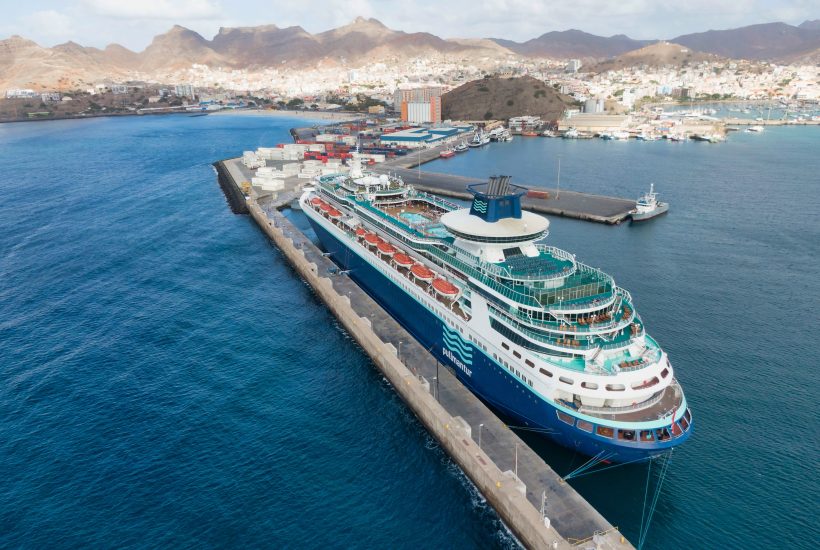Africa
Port Traffic in Cape Verde Increased to 133,000 Passengers in December
According to Enapor data, overall, Cape Verde ports handled 6,802 ships in port calls (+5.7%) during 2021, while goods movement also rose (8.4%) to 2,355,883 tons. Maritime passenger connections were fully suspended by the Cape Verde government between late March and mid-May 2020, with the state of emergency, to contain Covid-19 transmission.

According to the monthly traffic report from Enapor, the public company responsible for managing the archipelago’s nine ports, December’s record also represents 9.7% more compared to the previous month and is close to the historical record of 181,420 passengers in August, maintaining the recovery from the sharp declines since 2020, when inter-island passenger travel was constrained by measures to contain the Covid-19 pandemic.
The previous all-time high in inter-island shipping was recorded precisely in August 2021, with an overall movement of 168,901 passengers.
Read more about Cape Verde ports and find the latest economic news from around the world with the Born2Invest mobile app.
Cape Verde ports overall handled 6,802 ships in port calls (+5.7%) during 2021
Last December, the movement of passengers in Porto Grande represented 34.1% of the total and Porto Novo 30.1%, respectively in the neighboring islands of São Vicente and Santo Antão. The port of Praia, the country’s capital, recorded a 14.8% share of the total, with a movement that increased to 19,851 passengers, indicates the Enapor report, to which Lusa had access today.
CV Interilhas, led (51%) by the Portuguese Transinsular, of the ETE group, holds since August 2019 the concession of the public service of maritime transport of passengers and cargo, for 20 years, and concentrates these operations – which since last March also involve a local private maritime operator with regular connections between Santo Antão and São Vicente – having previously admitted that the pandemic represented a 30% drop in activity in 2020.
CV Interilhas alone transported about one and a half million passengers in three years of operations in the archipelago, according to data disclosed in August to Lusa by the company.
Overall, the ports of Cape Verde handled in December 699 calls of ships, up 18.3% compared to the same month of 2021, while the movement of goods, in year-on-year terms, fell 18.7% to 202,324 tons.
Lusa reported earlier that Cape Verde ports handled a record 1,089,013 passengers in 2021, an increase of 43.5 percent compared to 2020, recovering from the effects of the covid-19 pandemic.
According to the annual traffic report prepared by Enapor, 330,270 more passengers, in embarkations and disembarkations, were handled in the space of a year, compared to 758,743 in the whole of 2020.
With this performance, the ports of Cape Verde again surpass the mark of one million passengers moved in a year, reached for the first time in 2019, then with 1,069,642 and an increase of almost 9% compared to 2018.
According to Enapor data, Cape Verde ports overall handled 6,802 ships in port calls (+5.7%) during 2021, while goods movement also rose (8.4%) to 2,355,883 tons.
Maritime passenger connections were fully suspended by the Cape Verde government between late March and mid-May 2020, with the state of emergency, to contain covid-19 transmission.
As of September 3rd, 2020, the ships that provide these inter-island connections were allowed to use up to 75% of their capacity for trips longer than three and a half hours, compared to the 50% stipulated since the resumption of the service in May, due to the covid-19 pandemic, as provided for in a resolution of the Council of Ministers.
These restrictions were fully lifted in August 2021, by decision of the Cape Verdean government, due to the advanced vaccination process against covid-19, requiring passengers to present a negative test or vaccination certificate.
__
(Featured image by Secret Travel Guide via Unsplash)
DISCLAIMER: This article was written by a third party contributor and does not reflect the opinion of Born2Invest, its management, staff or its associates. Please review our disclaimer for more information.
This article may include forward-looking statements. These forward-looking statements generally are identified by the words “believe,” “project,” “estimate,” “become,” “plan,” “will,” and similar expressions. These forward-looking statements involve known and unknown risks as well as uncertainties, including those discussed in the following cautionary statements and elsewhere in this article and on this site. Although the Company may believe that its expectations are based on reasonable assumptions, the actual results that the Company may achieve may differ materially from any forward-looking statements, which reflect the opinions of the management of the Company only as of the date hereof. Additionally, please make sure to read these important disclosures.
First published in Africa 21 Digital, a third-party contributor translated and adapted the article from the original. In case of discrepancy, the original will prevail.
Although we made reasonable efforts to provide accurate translations, some parts may be incorrect. Born2Invest assumes no responsibility for errors, omissions or ambiguities in the translations provided on this website. Any person or entity relying on translated content does so at their own risk. Born2Invest is not responsible for losses caused by such reliance on the accuracy or reliability of translated information. If you wish to report an error or inaccuracy in the translation, we encourage you to contact us.

-

 Markets1 week ago
Markets1 week agoCocoa Prices Drop Amid Speculative Selling and West African Supply Concerns
-

 Cannabis5 days ago
Cannabis5 days agoIs Aurora Cannabis Stock a Risk Worth Taking?
-

 Impact Investing2 weeks ago
Impact Investing2 weeks agoEU Eases CO2 Tax Burden on SMEs with Revised CBAM Rules
-

 Fintech12 hours ago
Fintech12 hours agoRobinhood Expands to Europe with Tokenized Stocks and Perpetual Futures
























